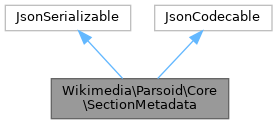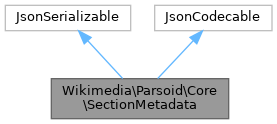Section metadata for generating TOC. More...
 Inheritance diagram for Wikimedia\Parsoid\Core\SectionMetadata:
Inheritance diagram for Wikimedia\Parsoid\Core\SectionMetadata: Collaboration diagram for Wikimedia\Parsoid\Core\SectionMetadata:
Collaboration diagram for Wikimedia\Parsoid\Core\SectionMetadata:Public Member Functions | |
| __construct (int $tocLevel=0, int $hLevel=-1, string $line='', string $number='', string $index='', ?string $fromTitle=null, ?int $codepointOffset=null, string $anchor='', string $linkAnchor='', ?array $extensionData=null) | |
| setExtensionData (string $key, $value) | |
| Attaches arbitrary data to this SectionMetadata object. | |
| appendExtensionData (string $key, $value) | |
| Appends arbitrary data to this SectionMetadata. | |
| getExtensionData ( $key) | |
| Gets extension data previously attached to this SectionMetadata. | |
| toArray () | |
| Alias for :toLegacy(), for b/c compatibility only. | |
| toLegacy () | |
| Return as associative array, in the format returned by the action API (including the order of fields and the value types). | |
| jsonSerialize () | |
| toJsonArray () | |
| prettyPrint (int $indent=0) | |
| For use in parser tests and wherever else humans might appreciate some formatting in the JSON encoded output. | |
Static Public Member Functions | |
| static | fromArray (array $data) |
| Alias for :fromLegacy(), for b/c compatibility only. | |
| static | fromLegacy (array $data) |
| Create a new SectionMetadata object from an array in the legacy format returned by the action API. | |
| static | newFromJsonArray (array $json) |
Public Attributes | |
| int | $hLevel |
| The heading tag level: a 1 here means an. | |
| int | $tocLevel |
| This is a one-indexed TOC level and the nesting level. | |
| string | $line |
| HTML heading of the section. | |
| string | $number |
| TOC number string (3.1.3, 4.5.2, etc.) | |
| string | $index |
| Section id (integer, assigned in depth first traversal order) Template generated sections get a "T-" prefix. | |
| string | $fromTitle |
| The title of the page that generated this heading. | |
| int | $codepointOffset |
| Codepoint offset where the section shows up in wikitext; this is null if this section comes from a template, if it comes from a literal HTML <h_> tag, or otherwise doesn't correspond to a "preprocessor
section". | |
| string | $anchor |
| Anchor attribute. | |
| string | $linkAnchor |
| Anchor URL fragment. | |
Detailed Description
Section metadata for generating TOC.
This is not the complete data for the article section, just the information needed to generate the table of contents.
For now, this schema matches whatever is generated by Parser.php. Parsoid will attempt to match this output for now.
Parser.php::finalizeHeadings() is the authoritative source for how some of these properties are computed right now, especially for the $line, $anchor, and $linkAnchor properties below.
Linker.php::tocLine() and ::makeHeadline() demonstrate how these properties are used to create headings and table of contents lines.
Constructor & Destructor Documentation
◆ __construct()
| Wikimedia\Parsoid\Core\SectionMetadata::__construct | ( | int | $tocLevel = 0, |
| int | $hLevel = -1, | ||
| string | $line = '', | ||
| string | $number = '', | ||
| string | $index = '', | ||
| ?string | $fromTitle = null, | ||
| ?int | $codepointOffset = null, | ||
| string | $anchor = '', | ||
| string | $linkAnchor = '', | ||
| ?array | $extensionData = null ) |
- Parameters
-
int $tocLevel One-indexed TOC level and the nesting level int $hLevel The heading tag level string $line Stripped headline text string $number TOC number string (3.1.3, 4.5.2, etc) string $index Section id ?string $fromTitle The title of the page or template that generated this heading, or null. ?int $codepointOffset Codepoint offset (# of characters) where the section shows up in wikitext, or null if this doesn't correspond to a "preprocesor section". (Be careful if using JavaScript, as JavaScript "characters" are UCS-2 encoded and don't correspond directly to code points.) string $anchor "True" value of the ID attribute string $linkAnchor URL-escaped value of the anchor, for use in constructing a URL fragment link ?array $extensionData Extension data passed in as an associative array
Member Function Documentation
◆ appendExtensionData()
| Wikimedia\Parsoid\Core\SectionMetadata::appendExtensionData | ( | string | $key, |
| $value ) |
Appends arbitrary data to this SectionMetadata.
This can be used to store some information about the section in the ParserOutput object for later use during page output.
See ::setExtensionData() for more details on rationale and use.
- Parameters
-
string $key The key for accessing the data. Extensions should take care to avoid conflicts in naming keys. It is suggested to use the extension's name as a prefix. int | string $value The value to append to the list.
- Returns
- never This method is not yet implemented.
◆ fromArray()
|
static |
Alias for :fromLegacy(), for b/c compatibility only.
- Parameters
-
array $data
- Returns
- SectionMetadata
◆ fromLegacy()
|
static |
Create a new SectionMetadata object from an array in the legacy format returned by the action API.
This is useful for backward-compatibility, but is expected to be replaced by conversion to/from JSON in the future.
- Parameters
-
array $data Associative array with section metadata
- Returns
- SectionMetadata
◆ getExtensionData()
| Wikimedia\Parsoid\Core\SectionMetadata::getExtensionData | ( | $key | ) |
Gets extension data previously attached to this SectionMetadata.
- Parameters
-
string $key The key to look up
- Returns
- mixed|null The value(s) previously set for the given key using ::setExtensionData() or ::appendExtensionData(), or null if no value was set for this key.
◆ prettyPrint()
| Wikimedia\Parsoid\Core\SectionMetadata::prettyPrint | ( | int | $indent = 0 | ) |
For use in parser tests and wherever else humans might appreciate some formatting in the JSON encoded output.
For now, nothing special.
- Parameters
-
int $indent Additional indentation to apply (defaults to zero)
- Returns
- string
◆ setExtensionData()
| Wikimedia\Parsoid\Core\SectionMetadata::setExtensionData | ( | string | $key, |
| $value ) |
Attaches arbitrary data to this SectionMetadata object.
This can be used to store some information about this section in the ParserOutput object for later use during page output. The data will be cached along with the ParserOutput object.
This method is provided to overcome the unsafe practice of attaching extra information to a section by directly assigning member variables.
See ParserOutput::setExtensionData() in core for further information about typical usage in hooks.
Setting conflicting values for the same key is not allowed. If you call ::setExtensionData() multiple times with the same key on a SectionMetadata, is is expected that the value will be identical each time. If you want to collect multiple pieces of data under a single key, use ::appendExtensionData().
- Note
- Only scalar values (numbers, strings, or arrays) are supported as a value. (A future revision will allow anything that core's JsonCodec can handle.) Attempts to set other types as extension data values will break ParserCache for the page.
- Todo
- When more complex values than scalar values are supported, TOCData::__clone should be updated to take that into account.
- Parameters
-
string $key The key for accessing the data. Extensions should take care to avoid conflicts in naming keys. It is suggested to use the extension's name as a prefix. Using the prefix mw:is reserved for core.mixed $value The value to set. Setting a value to null is equivalent to removing the value.
◆ toArray()
| Wikimedia\Parsoid\Core\SectionMetadata::toArray | ( | ) |
◆ toLegacy()
| Wikimedia\Parsoid\Core\SectionMetadata::toLegacy | ( | ) |
Return as associative array, in the format returned by the action API (including the order of fields and the value types).
This is helpful as b/c support while we transition to objects.
- Returns
- array
Member Data Documentation
◆ $anchor
| string Wikimedia\Parsoid\Core\SectionMetadata::$anchor |
Anchor attribute.
This property is the "true" value of the ID attribute, and should be used when looking up a heading or setting an attribute, for example using Document.getElementById() or Element.setAttribute('id',...).
This value is not HTML-entity escaped; if you are writing HTML as a literal string, you should still entity-escape ampersands and single/double quotes as appropriate.
This value is not URL-escaped either; instead use the linkAnchor property if you are constructing a URL to target this section.
The anchor attribute is based on the $line property, but does extra processing to turn it into a valid attribute:
- strip all HTML tags,
- normalizes section name
- normalizes section name whitespace
- decodes char references
- makes it a valid HTML id attribute value (HTML5 / HTML4 based on $wgFragmentMode property)
- dedupes (case-insensitively) identical anchors by adding "_$n" suffixes
◆ $codepointOffset
| int Wikimedia\Parsoid\Core\SectionMetadata::$codepointOffset |
Codepoint offset where the section shows up in wikitext; this is null if this section comes from a template, if it comes from a literal HTML <h_> tag, or otherwise doesn't correspond to a "preprocessor section".
- Note
- This is measured in codepoints, not bytes; you should use appropriate multi-byte aware string functions, not substr(). Similarly, in JavaScript, be careful not to confuse JavaScript UCS-2 "characters" with codepoints.
◆ $fromTitle
| string Wikimedia\Parsoid\Core\SectionMetadata::$fromTitle |
The title of the page that generated this heading.
For template-generated sections, this will be the template title. This string is in "prefixed DB key" format.
◆ $hLevel
| int Wikimedia\Parsoid\Core\SectionMetadata::$hLevel |
The heading tag level: a 1 here means an.
tag was used, a 2 means an tag was used, etc.
◆ $line
| string Wikimedia\Parsoid\Core\SectionMetadata::$line |
HTML heading of the section.
Only a narrow set of HTML tags are allowed here.
This starts with the parsed headline seen in wikitext and
- replaces links with link text
- processes extension strip markers
- removes style, script tags
- strips all HTML tags except the following tags (from Parser.php) . and (T10393) . (T28375) . (r105284) . <bdi> (T74884) . and (T37167) .
and(T35715) . <q> (T251672) We strip any parameter from accepted tags, except dir="rtl|ltr" from , to allow setting directionality in toc items.
- Note
- This should be converted into the proper html variant.
◆ $linkAnchor
| string Wikimedia\Parsoid\Core\SectionMetadata::$linkAnchor |
Anchor URL fragment.
This is very similar to the $anchor property, but is appropriately URL-escaped to make it appropriate to use in constructing a URL fragment link. You should almost always prepend a # symbol to linkAnchor if you are using it correctly. You are still responsible for HTML-escaping the resulting URL if you are emitting this as an HTML attribute.
◆ $number
| string Wikimedia\Parsoid\Core\SectionMetadata::$number |
TOC number string (3.1.3, 4.5.2, etc.)
- Note
- This should be localized into the parser target language.
◆ $tocLevel
| int Wikimedia\Parsoid\Core\SectionMetadata::$tocLevel |
This is a one-indexed TOC level and the nesting level.
So, if a page has a H2-H4-H6, then, those levels 2,4,6 correspond to TOC-levels 1,2,3.
The documentation for this class was generated from the following file:
- src/Core/SectionMetadata.php

